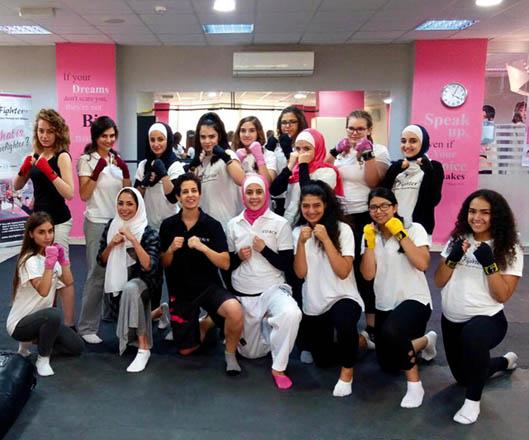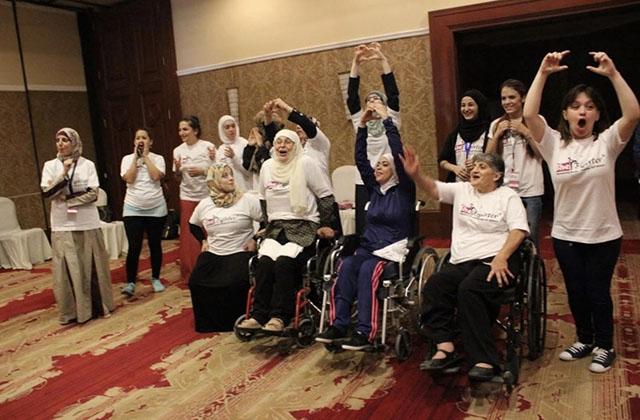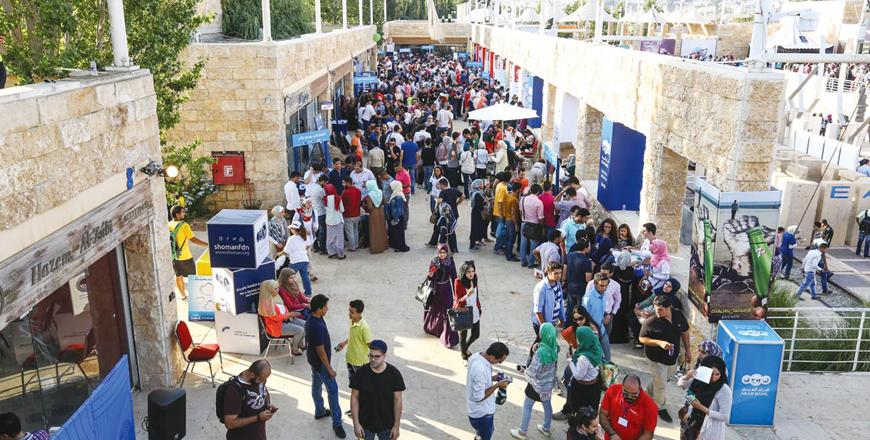You are here
‘First women’s self-defence studio in Middle East’ helps fight harassment
By Camille Dupire - Jul 18,2017 - Last updated at Jul 18,2017

SheFighter self-defence studio counts more than 5,000 members aged between 4 and 75 year old (Photo courtesy of SheFighter)
AMMAN — “After I was sexually assaulted in the street [in Amman], I realised that sitting in my room wouldn’t help me recover. Instead, I decided to learn how to protect myself and I joined SheFighter,” said 18-year-old Clarissa Leite, a Brazilian living in Amman.
Clarissa is just one of the many examples of how the women’s self-defence studio SheFighter has helped women gain the confidence to stand against aggression.
Founder and CEO of the studio Lina Khalifeh explained how she came up with the idea of a women-only self-defence centre in 2010, after she found out that one of her friends from university was repeatedly abused by her male relatives.
“Throughout my childhood, I have been harassed and bullied, and I always wondered ‘why do we have to accept this violence, just because we are women?’,” she said in an interview with The Jordan Times on Monday.
Starting with only two clients in the basement of her building, Khalifeh used the entrepreneurship knowledge she acquired through her studies to build her company.
Raised in a family of entrepreneurs, she was taught that “when you want something, and if you have the positive energy for it, you will always reach your goal”.
Her long experience in martial arts ranges from taekwondo, which she started at only five years old, to boxing, kung-fu and kickboxing, amassing some 20 gold medals in the field, including 3 international titles.
“When I started on my entrepreneurship path, I was really confused. I had the will, and the energy, but I wasn’t sure where to start,” the martial arts expert said, noting that her studies, combined with a great deal of patience, have helped her concretise her project.
For two years, she continued training women in her basement, alongside an intensive promotional campaign. “I went everywhere!” Khalifeh said, “I asked every school in Jordan if I could come and give their female students conferences for free.”
Some refused, telling her that “girls are not interested in that sort of thing”, she remembered. But she persisted, and finally gathered enough support to open her first official studio in 2012.
Two years later, she inaugurated the current SheFighter offices in Khalda, in a space three times bigger than her first location. With 5,000 members aged between 4 and 75 year old, and some 15 trainers, “it is definitely a change from the two clients I started with”, the young woman said.
The studio has grown to become a regionally-renowned institution, training women in Egypt, Palestine and across Jordan. A “hybrid business”, SheFighter combines profit making and voluntary training for refugees in camps and host communities in Jordan and abroad.
“I train locals to become trainers, and help them get certified,” Khalifeh explained, saying this is another way to empower women who live in local communities.
The studio does not limit its sessions to physical workouts; a number of psychological training workshops are also organised to help participants vocalise the negative experiences they might have experienced.
“When a woman joins, we ask her to commit to the full programme, both psychological and physical,” trainer Batoul Jaikat explained, noting that she “has seen a huge confidence boost in the women who attend the workshops”.
Fifteen-year-old Yara Al Zu’bi said she has gained a lot of confidence since she joined the studio: “This helped me stand up for myself and speak my mind in particular situations.”
Student Tala Muhtadi agreed: “I feel stronger now, more powerful. Before, I used to be scared to ride in taxis or to walk alone in the streets. But now, I know I can protect myself if need be.”
“I can do what I want with my head held up high,” she concluded.
According to the 2012 Jordan Population and Health Survey funded by the Jordanian government, 34 per cent of married women aged between 15 and 49 years-old have experienced physical violence at least once in the 12 months prior to the survey.
Twenty-two per cent of the women interviewed also reported having experienced one or more cases of emotional, physical and/or sexual violence from their spouse in the past 12 months.
To those accusing her of encouraging violence, Khalifeh responded: “You are lying if you say there is no violence in society; there is and always will be. So, when you encounter violence, you should be able to defend yourself.”
“It has not been an easy path. Sometimes, I just wanted to give up,” she admitted, saying she had to face lawsuits, personal intimidation and even a week-long hacking of SheFighter’s internal communication system.
But, with the support of her entourage and the growing attention she has received from the media and international figures around the globe, she persisted.
In September last year, British actress Emma Watson took to Facebook to praise Khalifeh’s work in challenging gender stereotypes and empowering women. “Ready for anything after SheFighter training with the amazing Lina Khalifeh,” she posted, along with pictures of her performing her latest boxing moves.
Khalifeh also drew the attention of former US President Barack Obama, who invited her to the White House where he praised her as a “leader of social change”.
Her projects now include opening a bigger studio, continuing to train women around the world, and finishing a book she started writing about her life experience in entrepreneurship and women’s empowerment.
Related Articles
AMMAN — SheFighter, established in 2010, provides self-defence courses for women with disabilities.SheFighter is the first self-defence cent
AMMAN — Young leaders who have made a considerable mark in their respective fields are convening at the One Young World Summit 2015 in Bangk
AMMAN — More than 40 organisations participated in “spreading new ideas” and raising awareness about empowering young people, women and chil


















